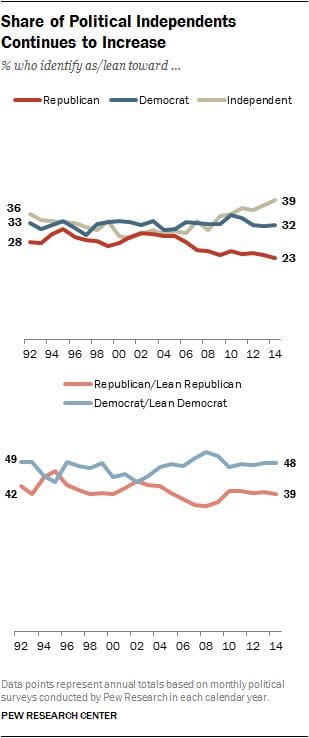The Media Gets Independent Voters Wrong -- And So Do Pollsters

A newly released Pew Research Center report once again shows that Americans who self-identify as independent remain near the 40-percent mark, but at the same time perpetuates the long-held stereotype that independents still fall only along red or blue lines and will vote in predictable patterns.

The essence of this particular chart highlights the common belief that the independent voter is really just a leaning Republican or Democratic voter who just doesn't want to label themselves as a party member -- or doesn't want to share their true political beliefs with pollsters.
By their numbers, only a very small percentage of independent voters fall outside the political ilk of the major parties.
And there's definitely a large kernel of truth to this. Both 2012 and 2014 saw massive increases in straight-ticket voting, indicating an electorate that is becoming more polarized than ever.
Also, we just aren't seeing the number of successful independent campaigns we would expect to see if close to 40 percent of the electorate is truly independent.
Yet, countering all of this, we have hard data showing that voters are registering as independent or "no party preference" in record numbers.
For the 2014 midterm election, 23.1 percent of California's registered voters chose to register themselves as "No Party Preference."
Similar patterns are being seen across the nation. In at least 8 states, registered independents outnumber voters registered with the traditional parties.
How can both of these concepts -- that there is no such thing as a "real" independent and the growing number of registered independents -- be true at the same time?
It's not like registering as an independent is without cost to the voter. In most states, registered independents cannot participate in the two-party primary process that determines who is on the ballot in the general election.
This is a huge price to pay for someone who is supposedly just a "left/right leaning" voter.
So what's missing from this paradigm?
What's missing is the refusal of the major media outlets to accept what it means to be an independent. This is the dialog we should be having:
- Being an independent means you can have political beliefs ranging from conservative to liberal, but;
- Being an independent means you are not beholden to a party's platform, agenda, cronyism, and/or endorsements.
- Being independent is a mindset, not an ideology.
- Being independent is the political flexibility to realize that there is no one perfect party, ideology, or platform.
- Being independent is the belief that government represents the people, not the organizational power of the political ilks of the politicians.
Right now, being independent in many states comes at a great cost: the inability to vote in an integral stage of the public election process; namely, the primary.
But as the independent movement gains strength and momentum nationwide, we will see that being independent isn't about being a leaning left/right voter... It's about changing the political system of the past hundred years that has created the entrenched, immutable partisanship we see in Washington today.
Photo Credit: Joe Belanger / shutterstock.com



